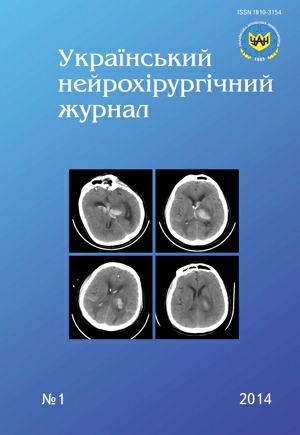Сlinical and neurophysiological estimation of cognitive function in patients with chronic cerebral ischemia in a period of recovery after surgery
DOI:
https://doi.org/10.25305/unj.51524Keywords:
cerebrovascular disease, cognitive disorders, diagnostics, ultracound dopplerography, cognitive evoked potentials, rehabilitationAbstract
Objective – to estimate the peculiarities of the cognitive function disorders and cognitive evoked potentials (CEP) changes in patients with cerebrovascular deseasis (CVD) in post-operative period and period of recovery.
Methods and subjects. 42 patients with chronic cerebral circulation impairment were examined. The patients were operated about the hemodynamic significantly stenosys in internal carotid or/and vertebral artery. The first clinical group included 20 patients, who had acute ischemic stroke; the second group comprised 22 patients without data on ischemic stroke in anamnesis. The methods used: clinical, neurological; neuropsychological testing (NPT), MRI, ultrasound study of the cerebral blood flow, EEG mapping, CEP P300.
Results. All studies were conducted in the period of recovery 6 months – 2 years after operation: carotid endarterectomy (14), endovascular angioplasty with stenting (12). Positive changes in blood flow in the area of stenosis, and in the affected intracranial artery and its branches were observed after surgical removal of stenosis. As evidence of cognitive impairment using the results of the NPT decrease by 1.5 σ or more, as a sign of slowing of mental processes – significant increase of the latent period of P300 to 2 σ or more, a significant reduction in the amplitude and increase asymmetry of these indicators. It confirms the correlation of negative effect on the NPT-CEP indicators and next factors: elderly age, decreased blood flow in the proximal segments of the middle cerebral artery by more than 20% of the age norms, absence (significant decrease) in reserve capacity of cerebral blood flow, site of the lesion in the right hemisphere, the presence of seizures.
Conclusions. Complex methodology of NTP-CEP allows to educe violations of cognitive functions for patients with CVD in the dynamics of surgery treatment and to control renewal.
References
1. Vibers DO, Fejgin V, Braun RD. Insul't. Klinicheskoye rukovodstvo [Stroke. Clinical Guide]. Moscow : Binom; Sankt-Peterburg: Dialekt; 2005. 2nd ed. Russian.
2. Skvortsova VI, Stakhovskaya LV, Gudkova VV, Alekhin AV. Khronicheskaya nedostatochnost' mozgovogo krovoobrashcheniya [Chronic cerebrovascular insufficiency]. In: Gusev EI, Konovalov VV, Skvortsova VI, Gekht AB., editors. Neurology: Nat. Gidelines. Moscow : GEOTAR-media; 2010. p.637-56. Russian.
3. Mishchenko TS, Lapshina IA, Mishchenko VN. Khronicheskaya ishemiya mozga (kriterii diagnostiki, novyye vozmozhnosti lecheniya [Chronic ischemia of the brain (the criteria for diagnosis, new treatment options)]. Ukr. Med. Chasopys. 2010;11-12(6):101-4. Russian.
4. Yakhno NN, Zakharov VV. Narusheniye kognitivnykh funktsiy [Cognitive impairment]. In: Gusev EI, Konovalov VV, Skvortsova VI, Gekht AB., editors. Neurology: Nat. Gidelines. Moscow : GEOTAR-media; 2010. p.532-47. Russian.
5. Zenkov LR, Ronkin MA. Funktsional'naya diagnostika nervnykh bolezney: rukovodstvo dlya vrachey [Functional diagnosis of nervous diseases: guidance for physicians]. Moscow : MEDpress-inform; 2004. p.64-201. Russian.
6. Gnezditskij VV, Korepina OS. Atlas po vyzvannym potentsialam mozga [Atlas of evoked potentials]. Ivanovo: Izd.-poligraf. Kompleks “PresSto”; 2011. Russian.
7. Kropotov YuD. Kolichestvennaya EEG, kognitivnyye vyzvannyye potentsialy mozga cheloveka i neyroterapiya [Quantitative EEG, cognitive evoked potentials of the human brain, and Neural]. Donetsk: Zaslavskij AYu; 2010. Russian.
8. Leliuk VG, Leliuk SE. Ul'trazvukovaya angiologiya [Ultrasonic Angiology]. Moscow : Real-Tajm; 2007. 3rd ed. Russian.
9. Vasilieva NYu, Zharinov OI, Kuts’ VA, Epanchintseva OA. Diagnostika kognitivnykh narusheniy u patsiyentov s arterial'noy gipertenziyey [Diagnosis of cognitive impairment in patients with hypertension]. [Internet]. Available at: http://www.rql.kiev.ua/cardio_j/2009/5/vasilyeva.htm.
10. Grigorova IA. Geletka EE, Teslenko OA. Otsenka funktsional'nogo sostoyaniya mozga po pokazatelyam kognitivnykh vyzvannykh potentsialov R300 i akusticheskikh vyzvannykh potentsialov u bol'nykh, perenesshikh polusharnyy ishemicheskiy insul't [Evaluation of the functional state of the brain in terms of cognitive evoked potentials P300 and acoustic evoked potentials in patients after hemispheric ischemic stroke]. Ukr Nevrol Zhurn. 2013;2(27):34-8. Russian.
Downloads
Published
How to Cite
Issue
Section
License
Copyright (c) 2014 Lidiya Chebotariova, Irina Stepanenko, Marina Globa, Oleksandr Solonovich, Lyudmyla Suliy

This work is licensed under a Creative Commons Attribution 4.0 International License.
Ukrainian Neurosurgical Journal abides by the CREATIVE COMMONS copyright rights and permissions for open access journals.
Authors, who are published in this Journal, agree to the following conditions:
1. The authors reserve the right to authorship of the work and pass the first publication right of this work to the Journal under the terms of Creative Commons Attribution License, which allows others to freely distribute the published research with the obligatory reference to the authors of the original work and the first publication of the work in this Journal.
2. The authors have the right to conclude separate supplement agreements that relate to non-exclusive work distribution in the form of which it has been published by the Journal (for example, to upload the work to the online storage of the Journal or publish it as part of a monograph), provided that the reference to the first publication of the work in this Journal is included.









